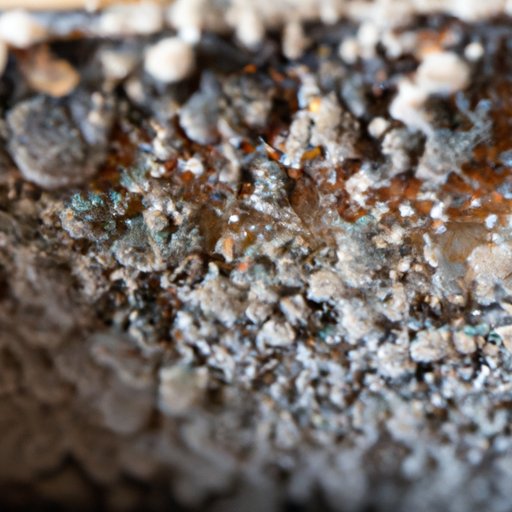
Introduction
Mold is a common issue that many people face in their homes or workplaces. Mold exposure can lead to severe health problems and, in severe cases, death. This article aims to explain what mold is, its potential health risks, as well as offer tips on how to prevent and manage mold exposure.
The Dangers of Mold Exposure: How it Can Impact Your Health
Mold is a type of fungi that grows in moist areas and thrives in damp environments. It can grow on surfaces such as walls, tiles, fabrics, and even food. Exposure to mold can cause respiratory problems, headaches, and fatigue. According to the Centers for Disease Control and Prevention (CDC), mold exposure can cause allergic reactions and other health problems, even in healthy individuals.
If you are experiencing respiratory issues such as wheezing, coughing, or difficulty breathing, it may be due to mold exposure. It is important to recognize these symptoms and seek medical attention immediately to avoid further health issues.
Mold Can Worsen Allergies and Asthma: Here’s What You Need to Know
Individuals with allergies and asthma are particularly vulnerable to mold exposure. Mold spores can trigger an allergic reaction, leading to symptoms such as sneezing, congestion, and itchy eyes. If you are experiencing these symptoms, it may be necessary to get an allergy test to determine if mold is the cause of your allergies.
Managing allergies and asthma in a moldy environment can be challenging. It is important to keep windows closed, install air purifiers, and use dehumidifiers. Maintaining a clean and dry environment can help to prevent mold growth, which ultimately reduces the risk of respiratory issues.
Toxic Mold Syndrome: The Symptoms and Risks of Exposure
Toxic mold syndrome is a type of mold exposure that can lead to severe health problems. It occurs when an individual is exposed to mold spores for an extended time, leading to neurological and immune system issues. Symptoms of toxic mold syndrome include memory loss, anxiety, neurological symptoms, and respiratory problems.
Individuals who are most at risk for toxic mold syndrome include the elderly, infants, pregnant women, and those with weakened immune systems. If you experience any of these symptoms, it is essential to seek medical attention immediately to reduce the risk of further health complications.
The Hidden Dangers of Black Mold and How to Prevent it in Your Home
Black mold is a type of toxic mold that produces dangerous toxins known as mycotoxins, which can lead to severe health problems. Black mold can typically be found in damp environments such as bathrooms, kitchens, and basements. It can also be hidden in water-damaged areas such as under carpets, drywall, and floorboards.
Preventing black mold growth in your home involves maintaining proper ventilation, fixing leaks, and keeping humidity levels low. Regularly cleaning and disinfecting your home is essential to avoiding mold growth and protecting your health.
Mold and Your Mental Health: How Toxic Exposure Can Impact Your Brain Function
Exposure to mold can also have impacts on your cognitive function and mood. Toxic mold exposure can lead to depression, anxiety, and other neurological disorders. If you are experiencing these symptoms, it is important to seek mental health support in addition to medical attention.
Managing stress and anxiety related to mold exposure can be accomplished through relaxation techniques such as yoga or meditation. Seeking professional mental health support can help you develop coping mechanisms and manage the impacts of mold exposure on your mental health.
Conclusion
Mold exposure can have severe impacts on your health and should not be taken lightly. Recognizing the symptoms of mold exposure, and taking action immediately, is an important step in preventing further health issues. It is essential to maintain a dry and clean environment to prevent mold growth and protect your health. Seek medical attention immediately if you suspect you have been exposed to mold or are experiencing any of the symptoms discussed in this article.




